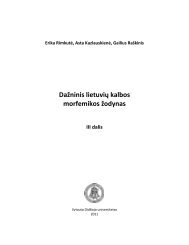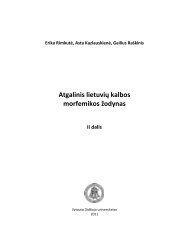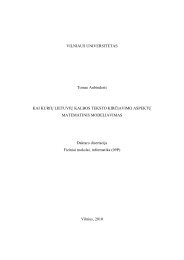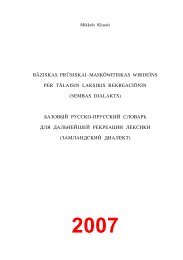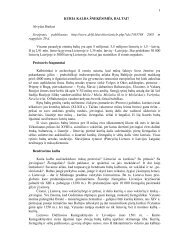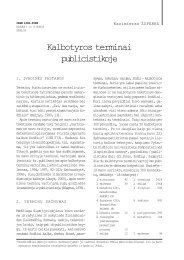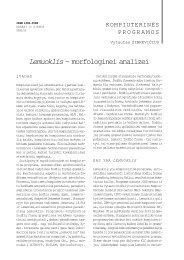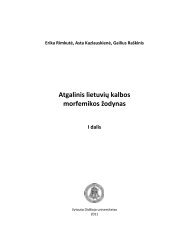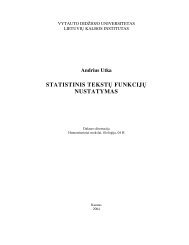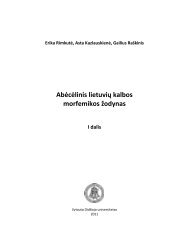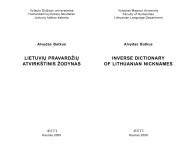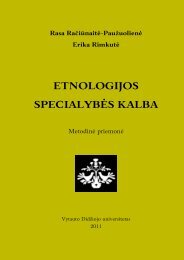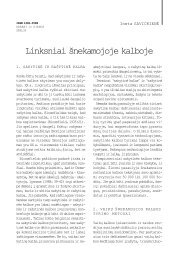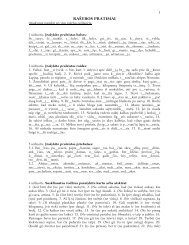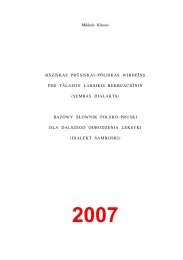HISTORICAL GRAMMAR OF OLD PRUSSIAN
HISTORICAL GRAMMAR OF OLD PRUSSIAN
HISTORICAL GRAMMAR OF OLD PRUSSIAN
You also want an ePaper? Increase the reach of your titles
YUMPU automatically turns print PDFs into web optimized ePapers that Google loves.
<strong>HISTORICAL</strong> <strong>GRAMMAR</strong> <strong>OF</strong> <strong>OLD</strong> <strong>PRUSSIAN</strong><br />
Suffixes with a consonant -m-<br />
* 62. There is a group of numerals with a suf. *-ma- in Prussian:<br />
sepmas I ‘seventh’ (PEÞ IV 102), acc. asman III ‘eighth’ (PEÞ I 103),<br />
pirmas I ‘first’ (PEÞ III 284).<br />
It seems to have been the analogy of *pirmas ‘first’, after which Pr.<br />
adjective *pansdauma- ‘last’ (pansdaumannien III, cf. Endzelîns SV 47,<br />
PEÞ III 219 with bibl.) was formed.<br />
There are also adjectives with a suff. *-im- in Prussian: *auktima-<br />
‘high (prominent)’ (cf. PEÞ I 114 ff. s.v. aucktimmien), *deznima- ‘frequent’<br />
(cf. PEÞ II 290 f. s.v. kudesnammi), *ilgima- ‘long’ (PEÞ II 294<br />
s.v. kuilgimai).<br />
In adj. *auktuma- ‘tall’ a suffix *-um- may be traced (cf. PEÞ I 116<br />
s.v. Auctume).<br />
* 63. Pr. suf. (a-/`-stem) adj. *-ôma- ( cf. nom. pl. tickrômai ‘rightful’,<br />
-tickrôms ‘righteous’) may be reconstructed as a composition of (consonant-stem<br />
nominative) *-ôn- + *-ma-, cf. Lith. *maþô(n) + *-ma- > adj.<br />
*maþuoma- --> subst. maþ ƒuom-enë ‘minority; pauperdom’ (for another<br />
view cf. Skardþius ÞD 237, Ambrazas DDR II 60 with bibl.).<br />
Suffixes with a consonant -l-<br />
* 64. Pr. suf. *-el-/-al- is well attested in (E), cf. areli[s] ‘eagle’ =<br />
*arelîs (PEÞ I 90). It is diminutive in patowelis ‘stepfather’ = *pat¯Éwelîs<br />
(PEÞ III 234), podalis ‘(worthless) pot’ < *pôdalîs (PEÞ III 302).<br />
Pr. suf. *-il- is represented in (E): sirsilis ‘hornet’ = *sirsilîs (PEÞ IV<br />
116 f.), wobilis ‘clover’ = *(v)¯Ébil is (PEÞ IV 259).<br />
* 65. With Pr. suf. *-ail- resp. *-eil- are derived (E): scritayle ‘rim’<br />
= *skritailç (PEÞ IV 124 f.), [c]rupeyle ‘frog’ = *krupeilç (PEÞ II 287 f.).<br />
much more archaic (IE) epoch and divides it into modal IE *-s- and IE suf. adj. *-no-, which (i.e.<br />
Balt. *-na-) may be traced either in Balt. suf. *-ena, *-ana. For all this cf. PEÞ I 153. Nevertheless<br />
the difference between *-sen` and *-sn` may have originated in binomial relation between<br />
barytone and oxytone forms in Western Baltic (not in Prussian itself!). – L.P.<br />
33



